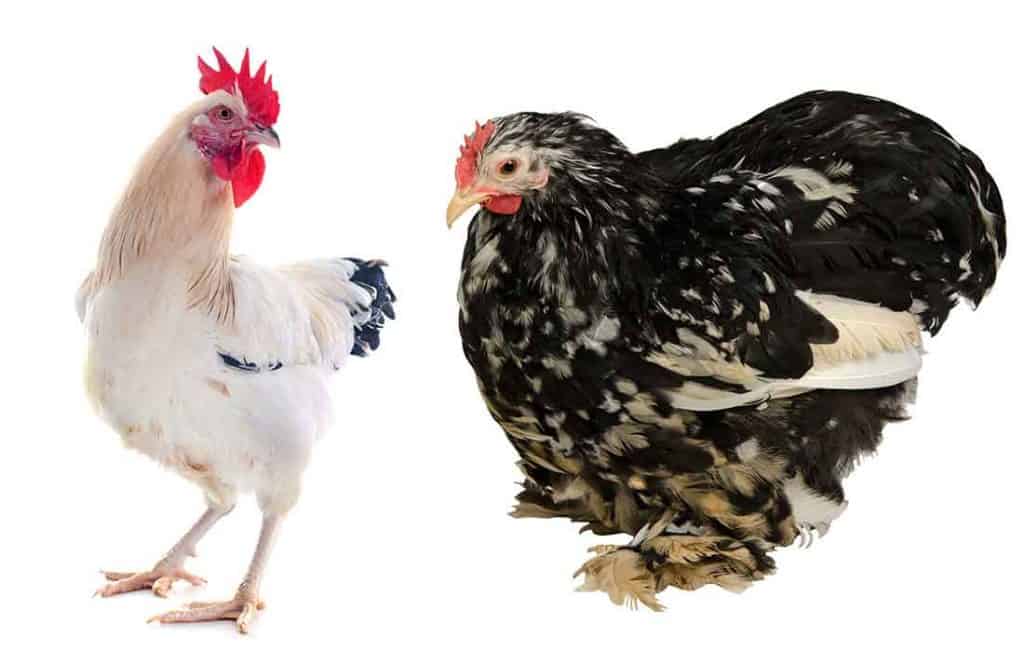Have you ever met a mean, grumpy, angry chicken? If so, it more likely than not was a breed that was NOT a Sussex chicken.
Are Sussex Chickens Aggressive?
Sussex chickens are docile, friendly, and confident non-aggressive birds. The roosters are not as aggressive as other breeds. If kept together with different chicken breeds, their friendly demeanor often puts them at the bottom of the pecking order.
Before you get a Sussex, you need to understand whether they will get along with your current flock.

Learn more about Sussex chickens and how they behave to help prepare you for owning them below:
Sussex Chickens
Sussex chickens come in both regular and bantam sizes and have many color variations. They have historically been bred as both meat and layer chickens.
Sussex Chicken Information
Sussex chickens come from England and, over the years, have become much more popular in the US.
They can be speckled, brown, buff, light, coronation, red, white, and silver. They feature single combs that are red, along with their wattles and earlobes.
Speckled Sussex Temperament
Friendly is the Sussex chicken’s middle name! They are docile and straightforward to handle. Like any other breed, hens and roosters will have different temperaments.
Sussex chickens will learn to follow you around for treats with a very laid back and mellow attitude. They are very low maintenance and gentle, which makes them perfect for beginners or children.
Sussex Chicken Facts
Sussex chickens will typically lay about five eggs a week that are brown. They will even lay during the cold winter months when other hens tend to stop or slow down laying drastically.
Here are a few additional facts about Sussex chickens we think you should be aware of:
- They begin laying their eggs once they reach maturity, around 16-20 weeks old.
- They are known to be a very hardy breed and do not require special care or treatment.
- The Sussex chicken was first bred in the UK in Sussex.
- They can live to be eight years old if taken care of properly!
- Sussex chickens have a lot of curiosity and are always alert and attentive.
What Is Chicken Aggression and How to Spot and Handle it?
Chicken aggression is real. One important thing to note about chicken aggression is that there is no intent or malice behind it.
The chicken does not intend and seek out to be mean. Aggression can is triggered by several things, including genetics, instincts, and hormones.
Variations in aggression lie within each chicken breed, meaning that although Sussex chickens are typically docile and sweet, there may always be that one.
Genetics
Sometimes, aggressiveness can be inherited via the chicken’s genetics.
If a chicken’s mother or father has aggressive tendencies, it is possible that this trait could be handed down to the offspring.
Instincts
Instinctually, roosters specifically take on the role to mate with the hens and protect the entire flock.
This means that he may become aggressive with another chicken that threatens his spot in the chicken hierarchy, or even you.
Roosters want to protect the entire flock, and any time he senses danger, he may display aggression.
Hormones
Teenage roosters are guilty of “acting out” (so to speak) in a way that might seem familiar to parents of human teens.
When a rooster is in his “teenage” years, his hormones are going wild, and the only thing on his mind is to mate.
It happens often: your sweet little rooster one day turns into an angry little man. What gives? His hormones have kicked into overdrive. He wants to assert his authority.
Handling Chicken Aggression
When dealing with an aggressive chicken, there are a few methods and steps you can take and try out.
Chickens have a pecking order, which is a hierarchy system in the little chicken world. It is essentially how the chickens determine social standing within their flock.
The chickens at the very top of the pecking order are the first to get food, water, and an excellent roosting spot.
The other chickens further down the chain get whatever is left. Usually, a rooster will be deemed to be at the very top. If your flock does not have a rooster, a hen will assume the “top hen” role.
Believe it or not, having a pecking order is the easiest way for chickens to be safe and avoid fights and injuries.
How to Handle An Aggressive Sussex Chicken?
A good idea to handle an aggressive chicken is to take the role of the top of the pecking order. Make yourself the boss and assert your dominance over the flock.
If your chicken is aggressive towards you, it is paramount that you do not back down. You should always be prepared and alert.
Knowing the signs of chicken aggression can help you to avoid or prevent any type of attack. A chicken raising its neck feathers with the wings pointed towards the ground and away from its body is a sign they are ready to attack.
This stance points to chicken aggression. You could potentially be flogged.
Flogging occurs when a rooster uses his spurs to jump forward and engage you, typically hurting or injuring your leg or where he makes contact.
Another sign of aggression from a chicken is stomping their feet. When a chicken stomps, it is best to go about what you were doing without paying it any attention.
If a chicken is beating their wings for no reason that you can pick up on, this can be a clue to aggression.
Usually, chickens will do this to seem bigger to other flock members and predators. Beware!
Utilizing food as a distraction for your chickens is also a way to keep chicken aggression at bay.
When entering the chicken run and coop, bring a small handful of enticing treats along with you to throw the aggressive one-off course.
Carrying around an aggressive chicken is proven to work! Pick the chicken up gently, hold them along your side, like a football. It prevents them from being able to flap their wings.
It is believed that the dominant rooster will get embarrassed in front of the other flock members by this. It asserts your dominance and command.
Eventually, they will respect and trust you and will no longer display aggression towards you.
Aggressive Chicken Breeds
Some of the most aggressive chicken breeds out there include:
- Old English Game chickens
- Sumatras, Malays
- Cornish chickens
- Oriental Game chickens
Rhode Island Reds and Aisles are also known to have their moments.
Rooster Aggression Vs. Hen Aggression

It is essential to note the difference between an aggressive rooster and an aggressive hen.
Speckled Sussex Rooster Temperament
Roosters, as we know, tend to assert their dominance, enjoy being at the top of the pecking order, and it is their life goal to protect the flock and mate with the ladies.
The Sussex roosters’ temperament will vary, depending on their environment. When they feel threatened or are trying to protect their hens’, they will become territorial and aggressive.
Female Sussex Chickens Temperament
Sometimes, hens can act aggressively as well. When sitting on her eggs, a broody hen can be very moody and aggressive towards other chickens and people.
When a hen is broody, watch out! She may puff up and take a few pecks at you. You may even catch her chest-bumping with other hens.
Hens may also try to be the top hen in the pecking order and may even fight for the spot. If you have an alpha girl on your hands, she may always be a little moody and less cuddly than the others.
For the most part, Sussex hens have an easy-going personality and are known for their excellent caretaking qualities, making them great mothers. Like Silkies, the Sussex hens go broody often and even look after eggs that aren’t their own.
What if My Sussex Chicken Defies the Norm and is Aggressive?
Although Sussex chickens are relatively sweet and easy to handle, there always is the “bad egg.” Sometimes, your chicken may be aggressive, and it has nothing to do with the breed, genetics, or hormones.
The chicken’s environment could lead him or her to aggression, or, despite any assumptions, your chicken is aggressive.
Taking the necessary steps to tame and tone down the aggression should be your first course of action.
Pay attention to the other chickens and how they react to your aggressive Sussex to rule out possibilities to find the aggression source. It may be that it is a freak thing.
Silkies tend to be one of the most gentle chicken breeds, and still, some roosters tend to be on the nastier side.
Final Word
While Sussex chickens are sweet, docile, and friendly, you may run into the one oddball that displays aggression.
Luckily, we provided some tips on how to spot it and handle it.
However, for the most part, Sussex chickens are great companions and extraordinary flock chickens.
Related Articles
